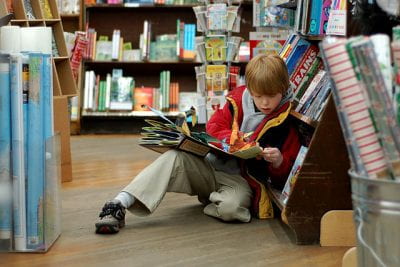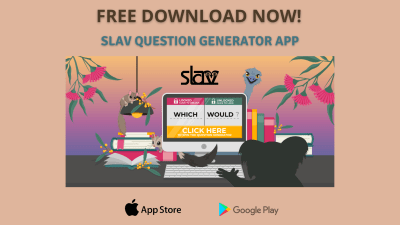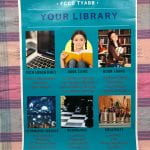
Our thanks to those of you able to join us for our recent book club meeting to discuss strategies and titles that have worked with reluctant readers. As we discussed in the meeting, there is an important difference between readers who are reluctant because of barriers to reading (low literacy levels, learning difficulties, etc.) and readers who are simply reluctant to read, despite being good readers. Readers who need to be encouraged and engaged. As always, so many of you had so many wonderful contributions to share with us, and it is very appreciated.
Below is the hugely diverse and broad list of titles and series shared and discussed. Some titles may have an indicated suitable age range next to each title, however this is merely a guide and we encourage you to use your own judgement, as you know your students best.
We look forward to seeing you at our next meeting on September 9th 2021 to discuss Culturally Diverse books.
Disclaimer: The lists generated as a result of Book Club discussions are not, by any means, an exhaustive list of all titles or authors for each genre/category discussed. Nor will all titles be suitable for all libraries. We advise staff discretion when referencing these lists, to properly confirm individual title suitability for individual libraries, school and students needs. These are suggested titles only, shared by our members and inclusion on, or exclusion from, a list does not suggest SLAV endorsement or rejection of a title.
Books for Reluctant Readers
Subjects/ formats of current interest –
DK Guide to Rocks and Gems
Science Comics, I Survived Series are good non-fiction graphic novels
Magazines
Non-Fiction Choose Your Own Adventure
Almost anything about cars
World War 1 & 2 nonfiction
The “Who is…?” and “Who was…?” biographies
Sporting/Athlete Biographies
Secondary – AFL and Cricket biographies are popular
Non-Fiction about sustainable living is really popular with secondary students
Younger format Biographies such as the Little People Big Dreams
All things Minecraft – guides and fictional stories to support the world building
National Geographic Weird but True
Dylan Alcott Biography
Anything about Skateboarding
We’ve had some interested in books about the share market
Recipe Books
Anything diary related is also popular.
We have had a huge resurgence in reading Stephen King novels (Secondary students)
Horror
Choose Your Own Adventure
True Crime
Strategies shared
Borrowing out both an audiobook and text version of the same book can be a great support. We’ve done that for struggling readers that want to take part in our Readers Cup challenge
Create a List of Dyslexia Friendly Books.
We’re trialling a Read Aloud option with our Year 9 boys who struggle. So far it’s working well with the boys keen to start each week… and others in the larger reading cohort wanting to join
We are doing the Premier’s Reading Challenge and we have a “quick reads” trolley with short and sharp novellas.
Build up a short story collection
For teachers: Jim Trelease’s The Read-aloud Handbook has great suggestions across all ages for books with a vibrant narrative voice(s). I’ve consulted it over the years — now in its 8th edition.
We have moved our books on film to the DVD stands
I’ve been working on pairing books with audio books that are exactly the same
My favourite thing to say “you won’t believe that will happen in Chapter 4” and the kids come back saying “OMG, you won’t believe it”.
Have Students recommend books. Display these face out with a tick on them (spine & front cover)
We do book chats in groups and students recommend books to other. The power of the friendship recommendation is strong.
Book Suggestions and Chat Discussion
Verse Novels
Steven Herrick
One and Also We Come Apart by Sarah Crossan
Love that Dog and Hate that Cat (great read aloud)
Bindi by Kirli Saunders
Graphic novels can be helpful
Alex Rider
James Patterson
Maximum Ride
Macbeth
Bartolo
The I Survived Series by Scholastic
Rod Serling’s The Twilight Zone
New Kid by Jerry Craft
Barrington Stoke Series
Other Suggestions
Guinness Book of Records
Factopedia
Amulet Series
Wings of Fire Series
My Hero Academia (Manga) The Boy Who Became a Dragon: Bruce Lee Story – Jim Di
Onjali Rauf, The Boy at the Back of the Class (refugee story).
Jack Heath’s short stories 200, 300 minutes of….
All Manga
High Interest Publishing – Canada – can be great for VCAL seniors, Literature Circles, class novel. Short snappy novels.
Horrible Histories
The Little Bookroom’s Recommendations for Reluctant Readers
Tried and true: Wonder Compendium by R.J Palacio (a boy I taught once said “This book feels like it’s reading itself to me”).
George Ivanoff’s Survival Series
Science Comics, I Survived series are good non-fiction graphic novels As well as: They Called Us Enemy by George Takei, The Best We Can Do by Thi Bui
Dropping In by Geoff Havel
Bubble Wrap Boy by Phil Earle
Biographies such as the Little People Big Dreams and the DK books. Students don’t have to commit too much time and can be used as a launching pad for more
Wonder is great and there are a few other titles that we market as ‘read alikes’ such as Ugly by Robert Hoge.
Bad Guys Series by Aaron Blabey
Anh Do’s Series – Wolf Girl, E-Boy, Sky Dragon all work well with Year 7 struggling readers
Hatchet by Gary Paulsen
Real Pigeons Fight Crime Series – by Andrew McDonald and Ben Wood – this is being adapted for an animated series on Nickelodeon
Primary School: try the Little Gem books by Anna Zobel they’re also good for children who have dyslexia. Billie. B. Brown and Hey Jack by Sally Rippin. School of Monsters by Sally Rippin
Our Australian Girl Series
Anything by Raina Telgemeier, Babysitters Club
Leigh Hobbs Old Tom which is a compilation of 4 to 5 picture books also works well with EAL readers. It is simple but looks like a big fat book.
The Cherub Series by Robert Muchamore is really popular with year 7 and 8 boys. Also Ultimate & Classic Football heroes books are very popular with boys who don’t usually like to read
The Poet X by Elizabeth Acevedo is great for older readers
Babysitters Club very popular. Start with the Graphic Novels and then show them the actual novels . Under 150 pages, good size text and easy language.
Anything by Gary Paulsen
F.L.Y. Financially Literate Youth is a good one for finance interests
Neal Shusterman – Unwind, Dry Lex Thomas – Quarantine good for reluctant but capable readers
Once Series by Morris Gleitzman
Dork Diaries, Tom Gates, Geronimo Stilton/Thea Stilton, and Adventure Time books also good for reluctant and/or EAL kids + early teens
I have students wanting to read about real stories / murder mystery e.g. OJ Simpson
Counting by 7s Holly Goldberg Sloan
Harry Potter and the Philosopher’s Stone by J.K. Rowling
Geek Girl got one of our reluctant readers started. Also agree with verse novels
Keeper of the Lost Cities’ Series by Shannon Messenger great for Harry Potter fans
Becoming Muhammad Ali by James Patterson is very popular. More inclusive books seem to work with our school community.
Quick Reads that connect to their interest area – Soccer (Ultimate Football Heroes)
Parvana is also available in Graphic Novel
My son loves The Hobbit by JRR Tolkien
The Crossover by Kwame Alexander’s
Daughter couldn’t put down Highway Bodies by Alison Evans
Anything Roald Dahl is really popular in my school at the moment
Scythe by Neal Shusterman walks off the shelf after book talking
My little sister started reading more in Year 12, she has read: My Best Friend’s Exorcism, Lonely Castle in the Mirror, Before the Coffee Gets Cold, and Convenience Store Woman. But not sure how some of these would do in high school libraries
We have had a huge resurgence in reading Stephen King novels with reluctant readers…the more horror the better
We had a book called ‘Crime Time: Australians behaving badly’ that was a collection of chapters timelining the history of Australian criminals. That was very popular when students were aware of it! Not so recent, but goes back to Ned Kelly times etc.
Risk by Ferris Fleur with students who don’t identify as readers. Mysteries such as One of Us is Lying by Karen McManus
Great Escape by Felice Arena is great to get kids interested in historical fiction.
Ready Player One by Ernest Cline
Minecraft novels appeal to players
Five Nights at Freddies Series is based on a video game. Quite scary.
We’re bringing in more Legend of Zelda Manga into the collection for the primary school children
D&D is very popular
Gamer trilogy by Chris Bradford (short, gritty, dystopian video gaming future). Chris Bradford, amazing author
Cry Blue Murder by Kim Kane & Marion Roberts also appeals because it breaks up the text
The Road to Winter by Mark Smith is very popular for year 9 very topical and fast moving. Any student that liked Tomorrow when the War Began by John Marsden will love it!!
None Shall Sleep by Ellie Marney
Red Eye Series, scary, thrilling, horror
They Both Die in the End Adam Silvera
Roller Girl by Victoria Jamieson
Making Friends by Kirsten Gudsnuk
Heartstopper GN Series by Alice Oseman
Reluctant readers have shown to like or seek books like Bro – similar background Lebanese
This is Where it Ends Marieke Nijkamp
Shadow and Bone by Leigh Bardugo is moving through our Year 8’s at the moment.
Carousel by Brendan Ritchie is popular
Wilder Girls by Rory Powers
One of Us Is Lying by Karen McManus – I would recommend for year 8-9 and good year 7s
After Wings of Fire – for primary, junior sec – The Dragon Prince by Aaron and Melanie Ehasz
Animorphs Graphic Novels
Warriors GN
Lumberjanes GN
This is How We Change the Ending by Vikki Wakefield
Kids are loving medical supernatural mysteries – Whisper/Weapon, The Program/The Treatment/The Remedy
A Trio of Sophies by Eileen Merriman is another one that I’ve had success with for students who have liked the one of us is lying series
Howl’s Moving Castle by Diana Wynne Jones
We can’t keep Fleur Ferris books on our shelves, always being borrowed.
Lightfall: the girl & the Galdurian by Tim Probert is another good graphic novel
Robert Cormier’s novels: oldies but goodies. We all Fall Down for Year 9+
Starters and Enders has had a resurgence at my school
Crazy Rich Asians by Kevin Kwan
Attack on Titan!! Love them
Manga readers are not reluctant and highly sophisticated in my view.
Manga most popular in my school – shelves always empty
Dog Man is really popular and really funny – Dav Pilkey
Captain Underpants, Toffle Towers, Nat Amoore’s books, Dog Man are all good humour
I know that there was a written anthology of short stories around “Attack on Titan” Manga, however I don’t know what reading level it is.
The Tokyo Ghoul manga series also has some companion novels, I have had some students use them as a bridge
Treehouse Series by Andy Griffiths and Terry Denton
Mercy Watson for the Preps and Year 1s
Atticus Von Tasticus by Andrew Daddo and Stephen Michael King
I have found the kids who read Manga are often interested in Art/Gaming so have spent money on the ‘Art of Manga’ and some have moved onto these nonfiction
The Bolds Series by Julian Clary
Some manga that’s popular in primary: Spirited Away, Legend of Zelda, Pokemon, Haikyuu!, Sailor Moon, Card Captor Sakura: Clear Card, Yuzu the Pet Vet, Chi’s Sweet Home,
Robert Muchamore’s CHERUB series and Henderson’s Boys series
Artemis Fowl by Eoin Colfer is funny too
The Funny KId by Matt Stanton series for lower/mid primary
Don’t Call Me Ishmael by Michael Gerard Bauer is very funny.
I agree that our Manga readers are thinkers and will happily bridge to a chapter book if it complements what they are reading in their Manga.
I think we often focus on “wide reading” and this lends to us trying to move readers “off Manga” rather than the skills of the student or the content of the Manga.
A Dog’s Purpose by W. Bruce Cameron
A Million Things by Emily Spurr – more adult but mature readers would probably like it too
Marley and Me by John Grogon
Because of Winn-Dixie by Kate DeCamillo is good
Aussie Nibbles, Bites, Chunks collections.
Pawcasso by Remy Lai
Warriors Series by Erin Hunter
Middle Grade Read -Living Next Door to Doctor Death – Spider Lee. Great short cliff hanging chapters. Both boys and girls love it.
What We Are Reading/ Adult Reading
Migrations and Once There Were Wolves by Charlotte McConaghy
The Prison Healer by Lynette Noni (YA)
The Dressmakers of Yarrandarra Prison by Meredith Jaffe
Anxious People by Fredrik Backman
The Paris Library by Janet Skelian Charles
Locust Summer by David Allan-Petale:
The Deep by Kyle Perry
Shuggie Bain by Douglas Stuart
Disappearing Earth by Julia Phillips
Lonely Castle In the Mirror by Mizuki Tsujimura
Mexican Gothic by Silvia Moreno-Garcia
The Seven Husbands of Evelyn Hugo by Taylor Jenkins Reid
The Mother-In-Law by Sally Hepworth
The Funny Thing About Norman Foreman
Codebreakers by Alli Sinclair
The Song of Achilles by Madeline Miller
A Good Girls Guide to Murder by Holly Jackson (YA)
Penguin Bloom by Bradley Trevor Greive
Before You Knew My Name – by Jacqueline Bublitz
Who Gets To Be Smart by Bri Lee
Songlines – Lynne Kelly
Surprising Power of a Good Dumpling by Wai Chim
Women and Other Monsters by Jess Zimmerman
The Silence of the Girls by Pat Barker
Ariadne by Jennifer Saint
Nemesis by Roth
The Golden Age by Joan London
Silent Footsteps by Sally Hepworth
The Pull of the Stars by Emma Donoghue
Dictionary of Lost Words by Pip Williams





